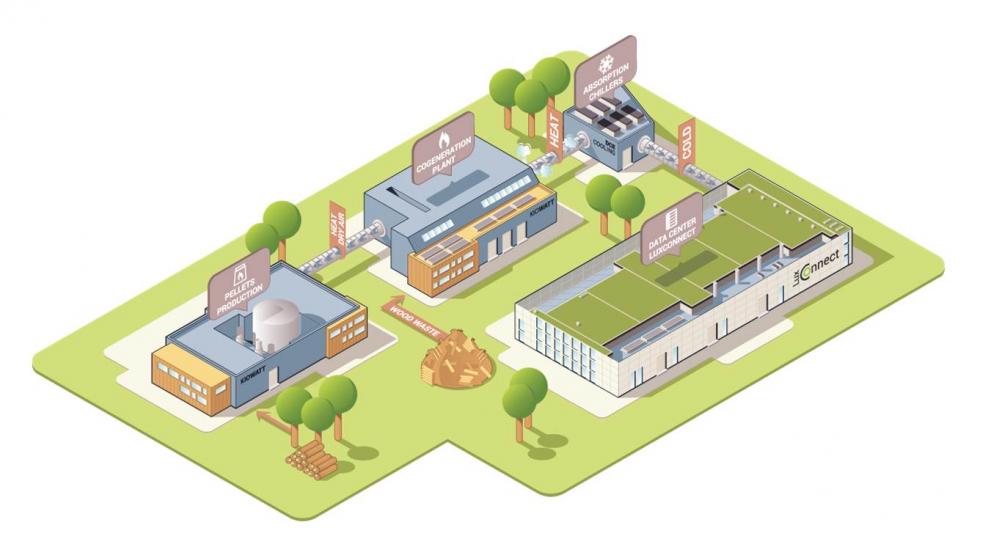
On 12 June 2018, the annual EU Code of Conduct for Energy Efficiency in Data Centres Award went to Luxembourg-based LuxConnect DC2.
The award aims to spread best practices in reducing energy consumption of data centres by recognizing the efforts of the best in class.
The award ceremony took place during the Datacloud Conference in Monaco.
LuxConnect DC2 was recognized for their data centre in Luxemburg which achieved a power utilisation effectiveness (PUE) of 1.25 and has implemented all the requested best practices.
PUE is an indicator of the energy efficiency of a data centre, with the ideal value being 1 and the global average around 2.0. Lux Connect DC2 uses waste heat from a biomass combined heat and power plant to produce cooling water, as well as the free cooling, and all purchased electricity comes from renewable resources.
Top performers over the last ten years
The tenth anniversary of the Code of Conduct Programme offered a good opportunity to celebrate the most outstanding performers over time.
To declare the all-time champions, a selection panel looked at all the previous winners across three categories: small data centres, large data centres, and companies at the corporate level.
The winners in each category offer the best examples of energy efficiency solutions and applications of the Code of Conduct best practices.
Small data centre - St Andrews University (Scotland, United Kingdom)
St Andrews University (Scotland, United Kingdom) was a winner in 2014.
Its measured power utilisation effectiveness was 1.28, with free cooling, an efficient technology to get rid of heat produced by servers, running most of the year.
All purchased electricity is renewable.
Large data centre - Google, St. Ghislain (Belgium)
Google, St. Ghislain (Belgium) was a winner in 2012.
It has a very efficient data centre with power utilisation effectiveness of 1.09 and it was Google's first data centre worldwide to run entirely without electrical refrigeration by using free cooling.
The St. Ghislain data centre also has an on-site water purification facility that allows Google to recycle water from a nearby industrial canal rather than use the city's water supply.
All purchased electricity is renewable.
Companies at the corporate level - IBM
With 38 IBM data centres in 18 countries in Europe committed to improving energy efficiency, IBM continues to make energy efficiency updates on its existing data centres.
In fact, the IBM operated sites in Europe have achieved average Power Utilisation effectiveness (PUE) between 1.67 and 1.69 - well below the industry average of 2.
This is IBM’s second award from the EU Code of Conduct for Data Centres, earning its first award in 2012, for having the largest number of data centres operated by a single company with the continuous commitment to improve energy efficiency.
The company regularly reports its achievement and energy consumption to the EU Datacentres Code of Conduct.
Growing appetite for energy in the ICT sector
By 2020 information and telecommunication technologies (ICT) are projected to account for four percent of all carbon emissions globally with the growth of the "Internet of Things" accelerating this trend.
With data centres being the main source of carbon emissions within the ICT industry, it is instrumental for businesses and organisations to reduce data centre energy consumption and provide energy savings that can compensate for future growth of ICT energy needs.
Code of Conduct for Data Centres initiative
The Code of Conduct for Data Centres is a voluntary initiative managed by the European Commission’s Joint Research Centre, with the aim to inform and encourage data centre operators and owners to reduce energy consumption in a cost-effective manner without decreasing mission critical data centre functions.
The assessment is made against a set of best practices to reduce energy losses which include the usage of energy efficient hardware, installing free cooling and cold aisle containment.
370 data centres have requested to join the EU Code of Conduct since the start of the programme in 2008 and 329 have been approved as participants.
In addition there are 249 endorsers in the programme, who are vendors, consultants or industry associations.
All participants have the obligation to continuously monitor energy consumption and adopt energy management in order to look for continuous improvement in energy efficiency.
One of the key objectives of the Code of Conduct is that each participant benchmark their efficiency overtime, using the Code of Conduct metric (or more sophisticated metrics if available) so to have evidence of continuous improvements in efficiency.
Related content
Code of Conduct for Energy Efficiency in Data Centres
Related Content
Details
- Publication date
- 13 June 2018
